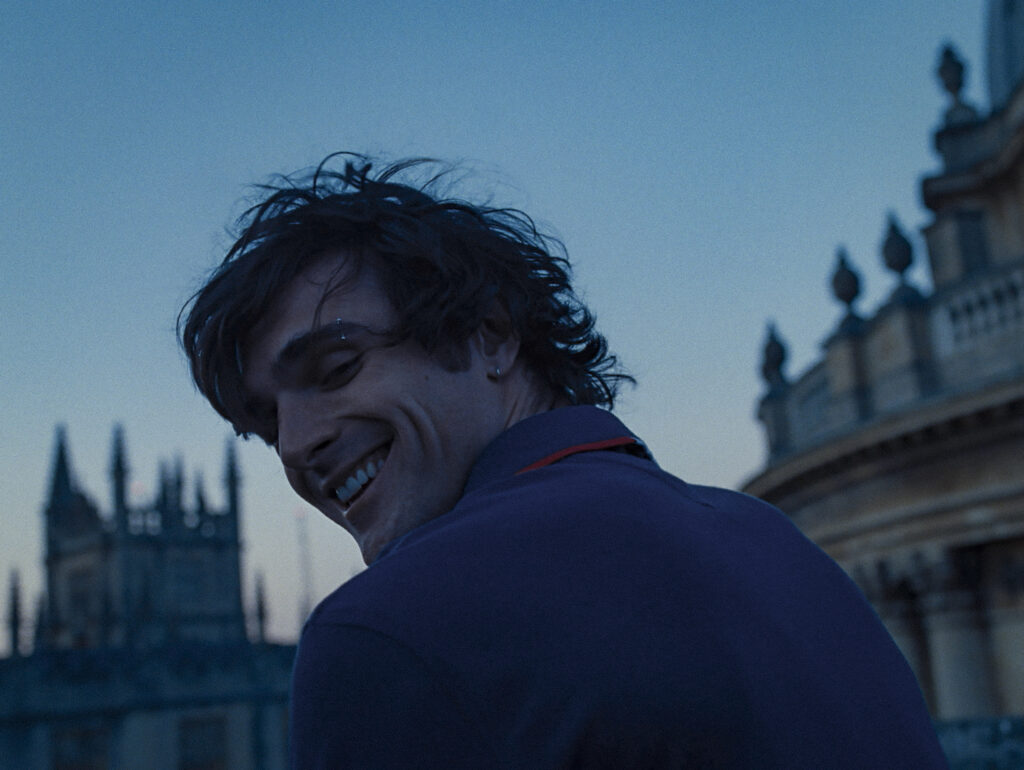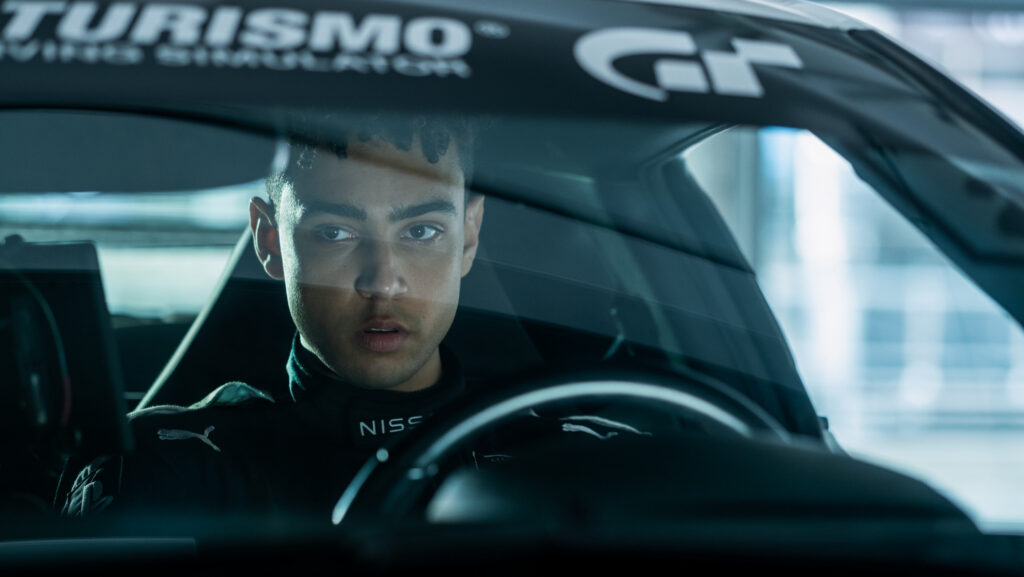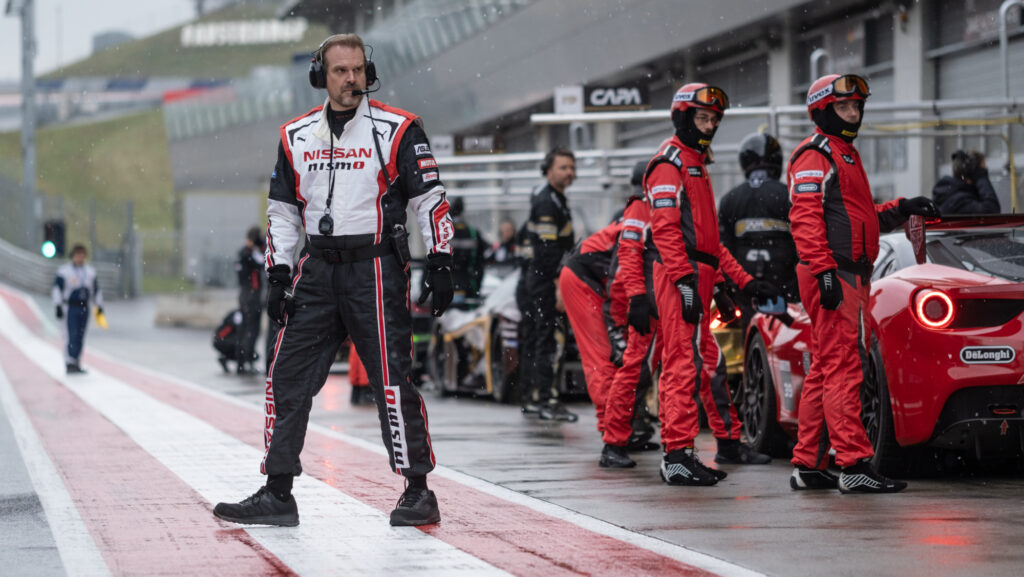November 17, 2023
by Carla Hay

Directed by Emerald Fennell
Culture Representation: Taking place in England, mostly in 2006, the comedy/drama film “Saltburn” features a predominantly white cast of characters (with a few black people) representing the working-class, middle-class and wealthy.
Culture Clash: A mysterious Oxford University student becomes infatuated with his rich male classmate, who invites him to spend the summer with him at his family’s sprawling estate, where mind games and chaos ensue.
Culture Audience: “Saltburn” will appeal primarily to people who are fans of the movie’s headliners and movies that skewer the upper class of society.

“Saltburn” seems inspired by “Brideshead Revisited” and “The Talented Mr. Ripley,” with a touch of “Absolutely Fabulous. “Although not as great as these inspirations, “Saltburn” has memorable performances and eye-catching scenes. The ending has a major plot hole. This plot hole might be easily overlooked during the sequence of events that are meant to shock viewers, but it’s a plot hole that nearly ruins what could have been a completely believable conclusion. Hint: “Saltburn” ignores the fact that coroners exist.
Written and directed by Emerald Fennell, “Saltburn” is her second feature film as a writer/director, following her 2020 feature-film directorial debut, “Promising Young Woman,” which won an Oscar for Best Original Screenplay. “Saltburn” has many recycled plot points from other movies, so “Saltburn” is not really all that original, but it does have some scenes that are fairly unique. “Saltburn” had its world premiere at the 2023 Telluride Film Festival.
“Saltburn” (which takes place mostly in 2006) begins by showing the arrival of a new student at Oxford University in England: Oliver Quick (played by Barry Keoghan) has joined the graduating Class of 2006 sometime in December 2005, close to the Christmas holiday season. Oliver is a loner who is the type of overachieving student who will read every book on a professor’s recommended list, even though he doesn’t have to do all that work.
One of the first people Oliver meets at Oxford is one of his roommates: Michael Gavey (played by Ewan Mitchell), who wants to be Oliver’s friend and is even nerdier and more socially awkward than Oliver is. Michael is the type of dork who will bark out demands that Oliver prove his knowledge of answers to random questions that Michael verbally throws at him. Michael likes to feel intellectually superior to almost everyone, even though he secretly craves acceptance from the popular students in the school.
The most popular clique in the class is led by a wealthy heartthrob named Felix Catton (played by Jacob Elordi), who uses his good looks and charm to get whatever he wants. The Catton family’s opulent and sprawling estate is called Saltburn. The other students in Felix’s clique are also affluent and/or come from prominent families.
The opening scene of “Saltburn” shows Oliver saying, “I wasn’t in love with him. I loved him, of course, Everyone loved him … I protected him … But was I in love with him?” Before he answers that question, the movie shows Oliver’s arrival at Oxford.
The “him” in Oliver’s opening monologue is Felix, of course. Oliver seems instantly infatuated with Felix the moment that he sees Felix. Oliver admires Felix from afar, until one day, Oliver is riding his bike on campus, when he sees Felix looking dejected as Felix is sitting near a tree-lined bikeway path. Oliver stops and asks Felix what’s wrong. Felix says that his bicycle has a flat tire.
Felix explains that he’s already late for a class, which is too far away for him to walk in order not to miss most of the class session. Oliver generously lets Felix borrow Oliver’s bike. A grateful Felix later invites Oliver to hang out with Felix and his inner circle at a local pub. It’s the beginning of a friendship between Felix and Oliver, who quickly shuns Michael after Oliver is accepted into Felix’s clique. Michael isn’t too happy about this rejection and later makes some hilarious cutting remarks to Oliver about Oliver’s social climbing.
Someone who also isn’t happy about Oliver joining the group is Felix’s American cousin Farleigh Start (played by Archie Madekwe), who sees Oliver as a socially inferior interloper. Farleigh already had a grudge against Oliver, who embarrassed Farleigh in front of one of their teachers named Professor Ware (played Reece Shearsmith), when Oliver showed he knew more than Farleigh about the topic of discussion.
However, Farleigh still has some clout with the professor, who confesses that Farleigh’s mother (a famous actress named Fredrika Start, who’s never seen in the movie) was his crush when he and Fredrika were students at Oxford. People who watch “Saltburn” shouldn’t miss the first 15 minutes of the movie, which quickly explains the backstories of Farleigh and Oliver, who end up having a rivalry over Felix’s attention.
Farleigh’s mother moved to the United States, where Farleigh was born and raised. She had some kind of mental breakdown and has financial problems, so she sent Farleigh to live at Saltburn, because her brother is Sir James Catton (played by Richard E. Grant), who is Felix’s father. Farleigh’s father is not in Farleigh’s life. It’s mentioned Farleigh has been expelled from many schools for getting sexually involved with male teachers. Farleigh feels a lot of resentment and shame for having to ask his uncle James for money.
As for Oliver, the word has gotten around to many students at the school that he’s on a scholarship. Oliver tells people that he is an only child, and his estranged parents are heavily involved in drugs. According to Oliver, his father is a drug dealer who’s been in and out of prison. His mother is a drug addict and an alcoholic. Oliver hints that he experienced a lot of abuse and trauma in his childhood. Oliver makes it clear that he wants nothing to do with his parents.
“Saltburn” breezes by the academic year to show the graduation of Oxford’s Class of 2006. With no immediate plans after graduation, Felix invites Oliver to stay for the summer with the Catton family at Saltburn. The best parts of the movie take place at Saltburn, which is not only a playground for the family’s indulgences but also a prison of bottled-up resentments, sexual manipulation, and psychological warfare. Oliver gets swept up in it all.
The other members of the Catton family at Saltburn are Felix’s self-centered and vapid mother Elspeth Catton (played by Rosamund Pike) and Felix’s jaded and insecure late-teens sister Venetia Catton (played by Alison Oliver), who have some of the best lines in the movie. Elspeth is the type of person who will smile and pretend that her insults are compliments. Venetia, who has an eating disorder, is both rebellious and needy.
All of the Catton family members don’t do much at Saltburn except smoke, drink, eat lavish meals, lounge around, and have parties. When the younger members of the family play tennis, they wear tuxedos and party clothes. The family has a longtime butler named Duncan (played by Paul Rhys), whose “stiff upper lip” mannerisms suggest that he’s heard and seen a lot of unmentionable things at Saltburn, but he is loyally discreet.
Carey Mulligan (the star of “Promising Young Woman”) has a small supporting role in “Saltburn” as Elspeth’s tattooed friend Pamela, who is staying at Saltburn after getting out of drug rehab. Pamela has overstayed her welcome, but Elspeth won’t come right out and tell Pamela to leave. The snappy rapport between redhead Pamela and blonde Elspeth will remind “Absolutely Fabulous” sitcom fans of the rapport between “Absolutely Fabulous” substance-abusing fashionista friends Edina “Eddie” Monsoon (the redhead) and Patricia “Patsy” Stone (the blonde).
“Saltburn” unpeels the layers of Oliver, who at first seems in awe and somewhat overwhelmed to be in the presence of the Catton family’s wealth. Slowly but surely, it’s revealed that there’s a lot more to Oliver than what he first appeared to be. And there are some things he does in the movie (especially those involving bodily fluids) that are intended to make viewers uncomfortable.
Keoghan gives a fascinating performance as Oliver, who is quite the chameleon. Madekwe is compelling in his depiction of the very snarky Farleigh, Oliver’s main adversary. Pike and Oliver are also standouts for their portrayals of a mother and daughter who are caught between smug vanity and crippling self-doubt. Look beneath the physically attractive surfaces of Elspeth and Venetia, and you’ll see two women who hate that their worth is defined by how they look and how much wealth they have.
Elordi is also quite good in his role as Felix, who is shallow but is a less-toxic member of the Catton family. “Saltburn” plays with viewers’ expectations of whether or not ladies’ man Felix will acknowledge Oliver’s obvious infatuation with Felix. And if so, what will be done about it? And what if Oliver gets rejected?
“Saltburn” has some stunning cinematography (by Linus Sandgren) that alternates between bright hues of idyllic luxury and the shadowy darkness of secrets and decadence. The movie’s production design and costume design are also noteworthy. “Saltburn” has some intense emotional scenes that are well-acted with clever dialogue.
Where “Saltburn” stumbles the most is in the last 20 minutes of the movie, which will be divisive to viewers. The concluding part of “Saltburn” is very suspenseful, but when answers to mysteries are finally revealed, they are rushed through the story and just create more questions that the movie never bothers to answer. Still, there’s no denying that the cast members’ performances are worth watching. And the movie’s flaws are outnumbered by the areas where “Saltburn” excels.
Amazon MGM Studios released “Saltburn” in select U.S. cinemas on November 17, 2023, with an expansion to more U.S. cinemas on November 22, 2023. Prime Video will premiere “Saltburn” on December 22, 2023.




